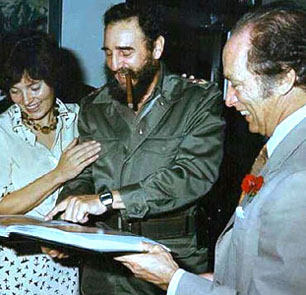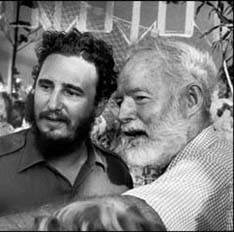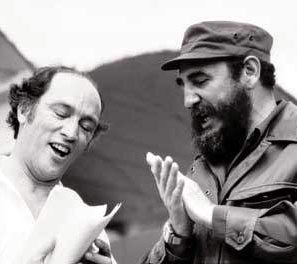Reaction to Justin Trudeau’s Fidel farewell just one early sign of new age of Trump .. well, sort of .. maybe?
Nov 28th, 2016 | By Counterweights Editors | Category: In Brief
As much as we want to escape the long arm of Donald Trump in the US (and other) mainstream media during the last lame-duck weeks of 2016, we keep bumping into it all, like it or not.
Up here in the true north strong and free the main media obsession of this past weekend has been Prime Minister Justin Trudeau’s controversial message “on the death of former Cuban President Fidel Castro.”
It has been widely condemned, apparently, in the US media, among opposition critics of the Trudeau Liberal government in Canada, and by various alleged wits on line, in the remarkable Age of the Internet.
Without wanting to disagree entirely with some of the criticism, we just can’t help but wonder whether at least quite a lot of it has quite a lot to do with the new world of acceptable or even required public comment, that Mr. Trump’s November 8 electoral college victory in the United States has introduced – even in such a liberal place as Canada.
Someone on Canadian English language TV yesterday did acknowledge that the essential first rule of messages on recently deceased persons of any sort is “do not speak ill of the dead.”
Yet underneath the bubble of life in the USA – and especially from a right-wing or even centre-right political perspective (the sort of thing that Trump’s victory has inevitably strengthened) – Â it is not right to say anything at all agreeable about the late Fidel Castro, without at the same time underlining very heavily that he was also an appalling dictator who murdered some political opponents and generally abused human rights in his own country.
The US government in particular, for some good and other bad reasons, has not just disagreed in principle with Cuba’s domestic regime over the past half century or so. It has essentially proscribed all contact with that regime for American citizens. President Obama finally broke the ice on this relationship, but who knows what will happen to his efforts under President Trump?
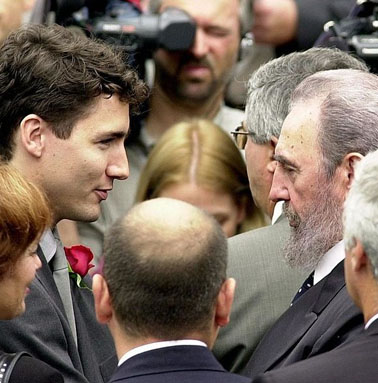
Fidel Castro and Justin Trudeau at funeral for Pierre Trudeau, Montreal, October 3, 2000. ROBERTO SCHMIDT/AFP/Getty Images.
In both Canada and Mexico, however, we have encouraged contact with Castro’s Cuba. Many Canadians (including some of our own best friends) have holidayed in Cuba during the Castro regime, and various Canadian (and Mexican) firms have established business enterprises there.
Former Prime Minister Pierre Trudeau, father of current Prime Minister Justin Trudeau, was a particular friend of Fidel Castro. In the spring of 1998 former Prime Minister Jean Chretien  paid the first visit to Fidel’s Cuba by a Canadian prime minister since Pierre Trudeau’s visit of 1976. And in the early fall of the year 2000 Fidel Castro was among the foreign leaders (also including former US president Jimmy Carter) who attended Pierre Trudeau’s funeral in Montreal.
We here have now looked over the original allegedly offensive message from Justin Trudeau, in its official format, and we do think that referring to the late Fidel Castro as “Cuba’s longest serving President” is a little too cute.
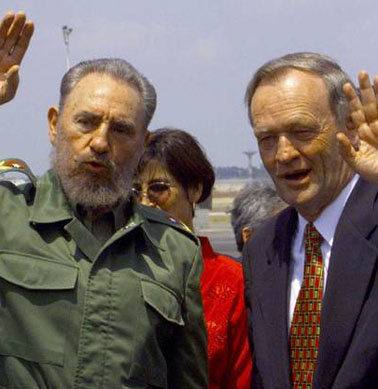
“April 28, 1998 – Canadian Prime Minister Jean Chretien with Cuban President Fidel Castro before departing for home ending a three day trip to Cuba, the first visit to the Communist-ruled island by a Canadian leader since Pierre Trudeau's in 1976. (Andy Clark/Reuters).”
After a brief apparently democratic beginning, Fidel Castro did of course degenerate into what the New York Times has called “above all an old-style Spanish caudillo, one of a long line of Latin American strongmen who endeared themselves to people searching for leaders. The analyst Alvaro Vargas Llosa of the Independent Institute in Washington called him “the ultimate 20th-century caudillo.”
But one thing Alma Guillermoprieto’s 1998 piece on “Fidel in the Evening” makes clear (recently revived by the New York Review of Books) is that there are people in Cuba who still have the same warm feelings about the Spanish caudillo Fidel Castro that a substantial minority in the United States have about the new English caudillo-elect Donald Trump.
And if we are encouraged to respect right-wing caudillos of this sort shouldn’t we also be encouraged to respect similar left-wing caudillos?
In any case, we would just like to go on record as joining the likes of federal cabinet minister Stephane Dion and Quebec premier Philippe Couillard in supporting the essential thrust of Prime Minister Justin Trudeau’s “deepest condolences to the family, friends and many, many supporters of Mr. Castro … On behalf of all Canadians.”
When all is said and done, the prime minister has certainly spoken for the side of Canada we see ourselves as part of. And we are grateful that we still have this Canada to identify with and reach out to, even in the troubling new age of Donald Trump.
